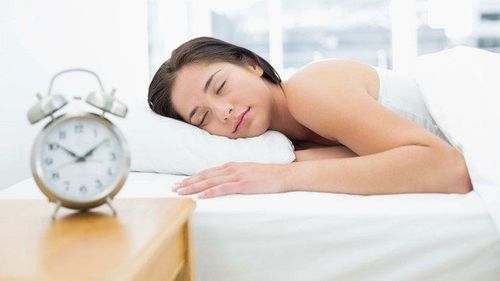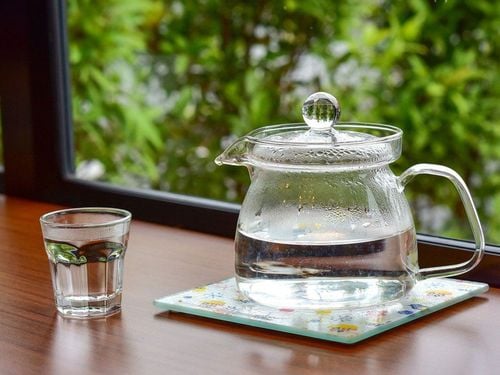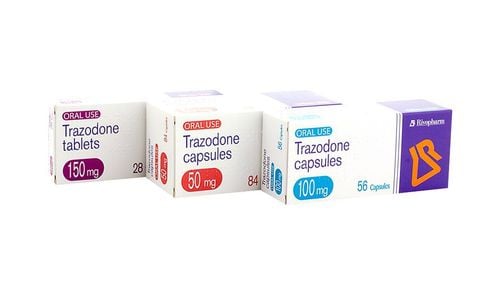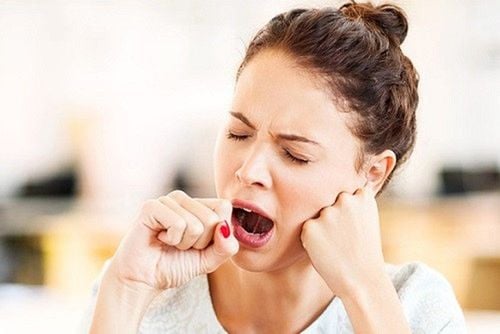This is an automatically translated article.
We all have nights that have trouble falling asleep or waking up in the middle of the night. You may also see this happening more often during the coronavirus (COVID-19) outbreak. Quality sleep makes a big difference to how we feel, mentally and physically, so it's important to get enough sleep. The tips below will help you fall asleep fast in 10, 60 or 120 seconds.1. How to fall asleep fast in 10, 60 or 120 seconds
Surely many of us have experienced a situation where it takes longer to fall asleep. Just the act of trying too hard can cause (or further) create the stress and anxiety that keeps our minds awake. And if the mind cannot be calm, then our body will have a hard time falling asleep. However, there are still science-based tricks we can use to make it easier to fall asleep.A very popular method in the military system, first adopted by Sharon Ackerman, comes from a book titled "Relax and Win: Unbeatable Performance". According to Ackerman, the US Navy's Pre-Flight School has created a routine where pilots can fall asleep in two minutes or less. It took the pilots about 6 weeks of practice, but it worked - even after they drank coffee or were surrounded by gunfire. This method is said to even work for people who need to sleep while sitting.
Although this method is done in 120 seconds, in fact, 60 seconds of the second half, especially the last 10 seconds is the most important time determining whether we can fall asleep properly fast or not.
2. 15 simple tips to help you fall asleep quickly
Good sleep is extremely important. It helps us feel good and makes it possible for the body and brain to function properly. Some people have no problem falling asleep. However, many others have severe difficulty and have trouble sleeping through the night. Poor sleep, or not getting enough sleep, can have negative effects on many parts of your body and brain, including learning, memory, mood, emotional disturbances and biological functions. difference. Here are 20 simple ways to fall asleep as quickly as possible:2.1. Lowering Temperature Our body temperature changes when we fall asleep. The body cools down when you start lying down and warms up when you wake up. If the room is too warm, you may have trouble falling asleep. Adjusting the room temperature to 15.6 – 19.4°C can be helpful.
A warm bath or shower can also help accelerate the body's temperature changes. A review based on multiple sources found that taking a hot bath before bed can improve certain sleep parameters, such as sleep efficiency and sleep quality. Study participants reported improvements in their sleep even when they showered or showered for as little as 10 minutes.

Tắm nước ấm trước khi đi ngủ có thể giúp bạn ngủ nhanh hơn
2.3. Set a sleep schedule Many people find that setting a sleep schedule makes it easier for them to fall asleep. Our body has its own regulation system called circadian rhythm. This internal clock signals the body to feel awake during the day but sleepy at night. Waking up and going to bed at the same time each day can help your internal clock keep a regular schedule. As your body adapts to this schedule, it will be easier for you to fall asleep and wake up at the same time each day. Getting 7 to 9 hours of sleep each night is also important. This has been shown to be the optimal amount of sleep for adults. Finally, give yourself 30-45 minutes to relax at night before bed. This allows the body and mind to relax in preparation for sleep.
2.4. Turn off all lights while sleeping Light can affect the body's internal clock, which regulates sleep and alertness. Infrequent light exposure, including light from electronic devices, can lead to disruption of circadian rhythms, making it harder to fall asleep and stay awake.
At night, darkness promotes your feeling of sleepiness. In fact, research shows that darkness promotes the production of melatonin, a hormone essential for sleep.
2.5. Yoga, meditation, and mindfulness When people are stressed, they tend to have trouble falling asleep. Yoga, meditation, and mindfulness are tools that calm the mind and relax the body. What's more, they've all been shown to help improve sleep. Yoga encourages the practice of breathing patterns and body movements to release the stress and anxiety that build up in our bodies. Research shows that yoga can have a positive effect on sleep parameters such as sleep quality, sleep efficiency, and sleep duration
Meditation can raise melatonin levels and assist the brain in achieving a state of mind specifically easy to fall asleep.
Finally, mindfulness can help you stay focused on the present, reduce sleep anxiety and even function better during the day
Practicing one or all of these techniques can help you have a good night's sleep and wake up full of energy.
2.6. Avoid looking at the clock It's normal to wake up in the middle of the night. However, not being able to fall back asleep can ruin our good night's sleep. People who wake up in the middle of the night tend to look at their clocks and obsess about their inability to fall back asleep. In addition, people with insomnia regularly watch the clock. This behavior will likely cause anxiety about insomnia. Worse still, waking up frequently without falling asleep again can cause the body to form a habit. As a result, you may find yourself waking up in the middle of the night every night.
If possible, it is best to remove the clock from your room. If you need an alarm, keep the clock out of sight and try not to look at it when you wake up in the middle of the night.

Nếu muốn ngủ nhanh, đừng nhìn vào đồng hồ!
In a study of 440 college students, the poorest nighttime sleep quality was observed in those who reported taking three or more naps per week, those napping for more than 2 hours, and those who took naps more than 2 hours per week. late sleepers.
A 1996 study found that older adults who took regular naps had lower nighttime sleep quality, more depressive symptoms, and more limited physical activity. They were also more likely to be overweight than those who rarely took a nap in the middle of the day.
A recent study of high school students concluded that napping during the day resulted in shorter sleep duration and lower sleep efficiency. However, other studies have revealed that napping has no effect on nighttime sleep
2.8. Adjusting your eating habits It seems that the food we eat before bed can affect your sleep. For example, research has shown that high-carb meals can be detrimental to our quest for a good night's sleep. A review based on multiple studies concluded that while a high-carb diet may help you fall asleep faster, it won't be a good night's sleep. Instead, high-fat meals can promote a deeper and more comfortable sleep.
2.9. Listening to Relaxing Music Music can significantly improve sleep quality. It can even be used to improve chronic sleep disorders, such as insomnia. A study of 24 young adults demonstrated that soothing music has the ability to promote deeper sleep.
Listening to Buddhist music can be another great tool for better sleep, as it can reduce the time it takes us to fall asleep. This parameter is called the sleep start time. Buddhist music is created from various Buddhist suttas and is used for meditation. Another study of 50 adults revealed that those who listened to soothing music for 45 minutes before bed had a better and deeper sleep. Finally, if you don't want to listen to relaxing music before bed, blocking out all the noise can also help us fall asleep faster and promote your uninterrupted sleep
2.10. Get regular exercise Physical activity is generally considered beneficial for your healthy sleep. Exercise has the potential to increase the length and quality of sleep by boosting serotonin production in the brain and reducing levels of cortisol, a stress hormone. However, it is important that you maintain a routine of moderate-intensity exercise and do not overdo it. Excessive exercise has been linked to sleep disturbances.
The time of day when exercising is also important. To promote better quality sleep, exercising early in the morning is better than exercising later in the day. Therefore, moderate exercise in the morning can significantly improve sleep quality as well as ensure uninterrupted sleep. Suggested fitness activities that are good for sleep include:
Jogging Hiking Cycling Playing sports like badminton, tennis, etc....

Tập thể dục đều đặn mỗi ngày có thể giúp bạn đi vào giấc ngủ nhanh hơn
Neck curve Body temperature Comfort A small study has determined that orthopedic pillows may be better for sleep quality than feather pillows or memory foam mattresses. In addition, the use of a blanket of moderate weight can reduce body pressure and help improve our sleep. Finally, the fabric of the clothes you wear to bed can affect your sleep. It's important to choose comfortable clothing with fabrics that help keep a comfortable temperature through the night
2.12. Turn off all electronic devices Using electronic devices at night is taboo for sleep. Watching TV, playing video games, using cell phones and social media can make it harder for us to fall asleep and get a good night's sleep. This is partly because electronic devices emit blue light, which has been shown to block melatonin. Using these devices also keeps our brains active.
Therefore, it is advisable to disconnect all electronic devices and put away computers and mobile phones so that you can ensure a quiet, undisturbed place. We will be able to fall asleep much faster if we practice good sleep hygiene.
2.13. Try Aromatherapy Aromatherapy involves the use of essential oils. People who have difficulty falling asleep are often taken because it can help with relaxation. A systematic review of 12 studies found that the use of aromatherapy was effective in improving sleep quality. Popular scents that have a positive effect on sleep include:
Lavender Rose Damask Peppermint Oil blends made with ingredients like lemon and orange are also effective in improving sleep quality sleep.
Although there are many uses for essential oils, many sleep studies focus on aromatherapy. An essential oil diffuser can be helpful in diffusing your room with relaxing, sleep-promoting scents.
2.14. Practice journaling before going to bed Some people have trouble falling asleep because of the thoughts running through their heads. Research has shown that this can cause anxiety and stress, create negative emotions, and disrupt sleep. Journaling and focusing on positive thoughts can calm our minds and help us sleep better.
Writing down positive events that happened during the day - or might happen in the future - can create a state of gratitude and happiness, reduce stress, and help you relax more at bedtime.
In fact, a study of 41 college students found that journaling helped reduce anxiety and stress before bed, increased sleep time, and improved your sleep quality. Take 15 minutes every night to write about our day's activities. It is important not only to focus on the positive events of the day but also on how you feel at the time.
Another study found that writing down a to-do list, for just 5 minutes, is even more effective than journaling in helping us fall asleep faster
2.15. Limit caffeine and drink other stimulants Caffeine is widely used by people to combat fatigue and stimulate alertness. It can be found in foods and beverages such as:
Chocolate Coffee Soft drinks Energy drinks

Để ngủ nhanh hơn, bạn nên tránh sử dụng các loại đồ uống chứa caffein trước khi ngủ
Difficulty falling asleep or having a hard time falling asleep not only makes us feel frustrated and uncomfortable, but also adversely affects our mental and physical health. Fortunately, however, there are science-based tips we can all use to improve sleep quality and ensure a deep, restful sleep. In case you have applied the above tips but still do not get results, you should consult a doctor or a sleep specialist for advice or treatment, to avoid prolonged insomnia affecting your health. life.
Please dial HOTLINE for more information or register for an appointment HERE. Download MyVinmec app to make appointments faster and to manage your bookings easily.
Reference source: healthline.com












